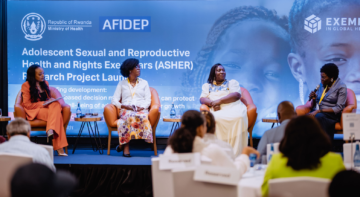Blogs

“Nearly half of all pregnancies, totalling 121 million yearly throughout the world, are unintended.” (State of World Population Report 2022)
The high levels of unintended pregnancies have unfortunate consequences for women’s and girls’ livelihoods. Keen to note is that with unintended pregnancies, over 60% end in abortion, and 45% are unsafe. The State of World Population Report also states that between 5% and 13% of all maternal deaths result from unsafe abortion.
About 160 million women worldwide have unmet needs for family planning, sub-Saharan Africa being the most affected (UNFPA 2022). Yet the world, through the Sustainable Development Goals, committed to “universal access to sexual and reproductive health-care services, including for family planning, information and education” (SDG3.7.1). Therefore, there’s an urgent need for the global world to find innovative ways to accelerate equitable contraceptive access and the choices it promises women and girls globally.
The 2022 International Conference on Family Planning (ICFP2022), conscious of the prevailing circumstances around women and girls, declared the need for fresh thinking in how the global community innovates, collaborates and accelerates to reach the global agenda target by especially reaching out to those with the highest unmet needs. The family planning community hopes that the shared learnings, best practices, and reflections on successes gleaned from this conference will invigorate family planning stakeholders, champions and advocates, to work towards a world where everyone everywhere has access to family planning information, resources and means.
The conference timing could not be any better. The global population reached the 8 billion in the same week of the ICFP conference. When reflecting on the 8 billion at the ICFP2022, the UNFPA Executive Director, Dr Natalia Kanem, said “It is a success story of people living longer and healthier lives, an indication of health advancement, and reduced maternal and child mortality rates.” She, however, called for a recommitment to leaving no one behind and encouraged efforts to support young people to reap the Demographic Dividend.
The 8 billion population mark also highlights the need for the world to put people at the centre of development action. It requires evidence-based plans and programs so that the 8 billion people live quality lives sustainably with the environment.
For over a decade, AFIDEP has championed evidence use in decision-making. Furthermore, about 40% of AFIDEP projects speak to the different facets of family planning. These seek to support policymakers with evidence to address the diversity of the family planning program challenges. AFIDEP placed this evidence in the hands of policymakers and stakeholders because national and global decision-making that will accelerate the 8 billion towards Agenda2030 must be based on relevant and timely evidence.
The ICFP2022 tagline is innovate, collaborate, accelerate towards universal health coverage and family planning. And to achieve the SDGs, especially as captured in Goal 17, “strengthen the means of implementation and revitalize the global partnership for sustainable development…” would require collaboration between researchers, policymakers, between the public and private sectors.
AFIDEP’s founding principle, is to bridge gaps between research, policy and practice in development efforts in Africa. AFIDEP brings to the world this contribution. Partnering with African governments, and supporting them in formulating effective programs and policies. This as an example to other stakeholders if they can emulate so that we can collectively, achieve Agenda2030.
FP is a universal right that everybody, everywhere, from all creeds, should access unhindered and without cohesion. AFIDEP calls on all ICFP2022 participants and the global world to walk the conference’s talk using relevant and appropriate evidence.
AFIDEP and partners held several sessions to share some of our ongoing project. These include the ‘Back-on-Track Project’ and Building Capacity for Integrated Family Planning and Reproductive Health (RH) and Population, Environment and Development (PED) Action (BUILD) project and Re-examining Traditional Method Use: Desperation or Innovation (TEAM-UP) project.
AFIDEP’s Team at ICFP2022:
| No | Title | Resource Person |
| 1. | Identifying Drivers of Exemplary Change in Contraception Use and Demand Satisfied in Malawi | Dr Eliya Zulu,
Executive Director, AFIDEP |
| 2. | Assessing Continuity of Modern Contraceptive Usage in the COVID-19 Period in SSA: A Geospatial Modelling Study | Dr. Michael Chipeta, Senior Research and Policy Analyst, AFIDEP |
| 3. | Mainstreaming Gender and Youth in Integrated PED Approaches for Sustainable Development | Dr. Marsden Solomom, Country Representative, Kenya, FHI360 |
| 4. | Barriers, Facilitators, and Opportunities for Integrating Family Planning/ Reproductive Health and Population, Environment and Development Approaches for Sustainable Development | Dr. Bernard Onyango, Senior Research and Policy Analyst, AFIDEP |
| 5. | Enhancing Population Environment and Development (PED) Policy and Practice through Knowledge Management | Dr. Joan Castro, Executive Vice President, PATH Foundations Philippines Inc |
| 6. | Measurement approaches for estimating prevalence and dynamics of traditional method use: A study in four African countries | Dr. Maame Peterson Research and Policy Analyst, AFIDEP |
| 7. | Barriers, Facilitators, and Opportunities for Integrating Family Planning/Reproductive Health and Population-Environment and Development Approaches for Sustainable Development: the BUILD Project Landscape Analysis Study | Dr. Naa Dodoo, Senior Research and Policy Analyst, AFIDEP |
Related Posts





